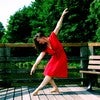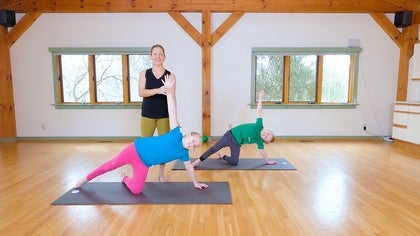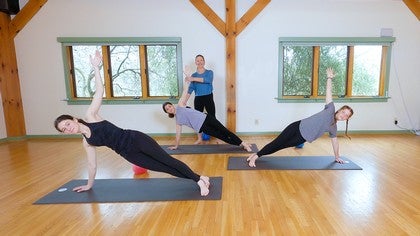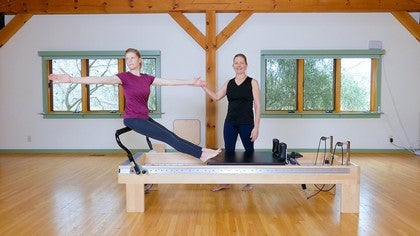Description
Shelly starts with an overview of the goals she has for this class. The movement portion begins around 2:32.
About This Video
Transcript
Read Full Transcript
Hi everybody. I'm Shelly Power from Polestar Pilates. And welcome to another class in our knee health series. So we thought it was important to kinda go back to basics and start with working with kids. That was something that Joseph Pilates wanted.
And we're gonna go back to one of his guiding principles, which is whole body health. So as much as this class is designed for preventing and helping to prevent knee injuries, but really it's about everything. We could think about shoulder injuries, better posture, all these different things are included in whole body health. So you can use this class for anybody anytime. And if you watch kids play, they're down on the floor, they're crawling, they're doing all types of different movements.
By the time we're adults, we've kind of, we've stopped doing it. So one, we wanna get healthy habits early. So movement that's fun, that's fun to do. But hopefully we maintain that as we age, so that when we're adults, we don't have to go back and relearn these things. So that's one of my goals with this class.
And with this age, and you can see we're working with a little younger population, we're at a place where the magic windows, what it's called between about nine years old and 12 or 13 years old, before puberty and before the growth spurt, we have an opportunity to work on coordination and balance. The nervous system is really adaptable at this age. So it's really good to play games and do outdoor activities, Pilates classes, all types of things like that to work on coordination, because this is the time where we can really do a lot and lay down some good foundational movements. So that's what this class is about. But feel free to join, even if you're an adult, it's fun to do.
We're gonna do some Pilates movements and then we're also gonna do some non Pilates movements to work again on mobility, on control, on alignment, all three of those things together that we put then into what we call movement integration or the whole body, the whole body movement. So we're gonna get started. If you have a ball, just something small like this, it doesn't have to be anything for Pilates. It could be a basketball, it could be anything. Have it because we're gonna use it toward the end of the class to work on balance.
So if you don't have it, you could certainly substitute something else or just work on the balance part of it on your own. We're gonna put the ball down so we can start class. You guys can turn to face sideways. And have your feet just a little bit apart in front of you. And we're gonna start with the windshield wiper legs.
So bend your knees. And just start to let your knees go one way and the other. And this is a great movement, because we're not only getting movement in the hip joint, but we're getting movement in the spine as well. And we're getting some motion back at the shoulder too, where they can start working on getting the hands back farther. And then sit up tall and cross your legs.
And you could certainly use the traditional mermaid sitting position, with one leg in the front and one leg to the side. But this is an easier position for most people, so I tend to teach it this way. So now stretch your arms out and stretch over to the side. And then stretch over to the other side. So we're getting a stretch on the sides of our body.
And this is helping to get more mobility in our ribs, in our spine. And it also helps you with your breathing, which is kind of fun. So this time stretch over and hold right here and we're gonna add a twist to it. So start to go under, like you're gonna reach back. And then reach to the ceiling.
And then reach back and twist your spine. And reach to the ceiling. One more. Reach under. And reach up.
And then go to the other side. And change and reach around. And then stretch up to the ceiling. And reach around. And up one more time.
Give it a big stretch this time. When you reach up to the ceiling, really stretch tall. Great. And then come up and sit here. Good.
And it's important just to remind kids that it's easy to just kinda sit there. It's better if they can start to sit up a little bit taller. So our next exercise is called the roll down or the roll up. It depends on where you start. So bring your legs in front of you.
And you're gonna hold on to the backs of your legs the whole time. And this is the slow version of it. So you're gonna start to roll backwards. And then bring your knees into your chest. Yep.
And then roll back up. You got it. Do that a couple of times. So roll back. And when you roll back, go ahead and put your head all the way down, so your neck can relax, and then roll yourself back up to sitting.
Good. And roll back. And just look straight ahead of yourself. And you guys, you know what you can do? Roll up one more time.
Start to, when you roll back, leave your feet on the ground a little bit longer. So roll back and keep your feet down. Yeah. And then roll all the way down. And then roll all the way back up.
You got it. A little bit of momentum never hurt. Roll back. One more time. Roll as far back as you can.
Put your head down and then come back up to sit tall. That was a nice one. Those last ones were really good. So this time roll back. And we're gonna stay down.
So once you roll back, put your feet on the mat. And we're gonna do an exercise called the hundred. And the hundred is a really popular Pilates mat exercise, but we're gonna do it with the feet down to start. So stretch your arms really long. And make your whole spine and your body as long as it can be.
And then start to pump your arms up and down. And while you're pumping your arms, you're gonna breathe in. And then you're gonna breathe out. And we're gonna do that 10 times. So this is our second time.
Keep going. And exhale. And so this is helping us to get more mobility in our ribs, more mobility in our lungs. Keep going, keep pulsing. Good.
A couple more times. We don't need to do a full hundred, but this is our breathing exercise for the day. And whenever you're stressed, sometimes when you're having trouble concentrating, deep breathing is really helpful. And then stop and put your hands down. So now we're gonna do the fast rolling.
And in Pilates, we call this rolling like a ball. So you can bring your knees back into your chest and roll yourself up to sit tall. All right. So the goal is two things. One is try to roll in a straight line.
That's the tough part 'cause sometimes you go all over the place. The other is to find your balance here. So when you come back up each time, you're gonna try to keep your feet up. But if your feet touch, it's okay. All right?
And when you roll back, be careful not to go so far that you bump your head. All right? Are you ready? Yeah, but do we keep our hands on our legs? Yeah, you keep your hands on the legs the whole time.
All right? I thought we do the thighs this time. No, we're gonna do legs this time. So it's a little different. So are you ready?
Here we go. Start to roll back. And then roll back up. Good job. And do it a couple of times.
Roll back. And roll up. Come up to sitting. Roll back. And roll up.
Good. We're working on our balance. All the way up. Two more times guys. Roll back.
And roll up. And one more. This is a place where people laugh in class 'cause it's kind of a funny exercise. And come up. And rest.
Good. So that's rolling like a ball. The next thing we're gonna do is come onto your hands and knees. Okay? So on your hands and knees.
And I want you to have your arms and your legs straight up and down. That looks good. From here, we're gonna do an exercise, people call this the cat and the horse. Sometimes they call it the cat and the cow. I don't understand all of these animals, but you're gonna round your spine and look in towards your legs.
And then you're gonna do a little arch in your spine and look forward. That's it. Round your spine. And make it, yeah, big curve. And then make it curve the other way and look up gently, not too high.
And then round. So all of this movement is helping to put mobility, lots of movement in your spine. One more time. Round. And arch.
Now can you find the center of those two positions? So you look like a table. So look down at the floor. Bring your head up just a little bit. That's great.
And now keep that body position, but stretch out one arm and the opposite leg. And see how your balance is. Change sides. Go on the other side. That's it.
You got good balance guys. And keep switching back and forth. And try to do it where your body doesn't wiggle. So stretch out. Keep that position.
Good. One more on each side. Very nice. And the more you're doing it, the better your balance is getting. Spoke too soon.
And then everything comes down and pause for a second. Now that was so good that I wanna try something a little bit more challenging. Same arm and leg. And I'll give you a hint, so don't go yet. You can sit back over your heels for a second.
If you're doing this movement, and your hands and your knees are aligned directly, it's really tough. So let your hands go a little bit wider than your knees and that'll be easier. And you don't have to even tell anybody. You're just gonna do it just like that. So come onto your hands and knees and put your hands a little wide.
Yeah, that's it. Now see what it's like to just do the same arm and leg. And then stop right there. Change sides. Do the other same arm and leg.
Beautiful. Yeah, that's it. Good job. Nice Elaine. Now this time when you do it, put your toes on the ground and turn over to the side.
And this is called the star. So stretch out. Keep your knee down. Keep your knee down. We're just doing knee down first.
That's it. Yeah, just like that. And then change sides. Go through the center. And now do the other side.
So face the back of the room. And stretch. Good. Now your foot down is helping you. So when you change this time, change to the other side.
Face the camera. And when you go, see about lifting your leg up in the air. So keep your knee down and lift up. And now you look like a star. Good job.
Great balance you guys. Do the other side. One more time. This is our last one. Stretching and lifting.
Sparkling a little bit like a star. Finding your balance. And then gracefully come back down and put all your hands and knees down. And sit back over your heels and you can stretch your back a little bit and kinda just look back and put your head down. Yeah.
Now come up to high kneeling. So that's kneeling on your knees. Yep, all the way up tall. You got it. Now this is an exercise that is called the spine twist.
And normally we do it sitting down, but I thought it would be fun if we did it today in kneeling. So you're gonna cross your arms over. You can hold onto your arms or you can hold your forearms. And you're gonna keep your hips facing forward. Rotate your body toward the camera.
And then rotate away from the camera. You got it. And when you're doing it, see if you can keep your hips facing forward and twist only your spine. And then go to the other side. Keep your hips facing forward.
Last set. Twist, like somebody's ringing you around the sides. And face away from the camera, face the back of the room. And then come back into the center and pause. Good.
Lie down all the way on your front. So face down on your tummy with your legs outstretched. And you're gonna put your hands by your rib cage, like you're gonna do a pushup. So put your hands flat. You got it.
And now aim your elbows back a little bit. And come up in a little baby arch in your upper back. Just that much. And then come back down. And just a little baby arch.
Yeah. And come back down. So this movement, it should feel kinda light. It shouldn't be uncomfortable, just a tiny stretch up. And this helps us combat all of our sitting that we do all day long.
One more. And this gets us ready for an exercise called the swan. So this time, come all the way up onto your knees and do that same shape. Yes, that's it. Keep lifting your hips up.
And then roll your body down slowly. And roll up. And you wanna make sure that you lift your hips up a little bit. There. And roll down.
And we'll do it one more time. That's great Elaine, I hear you breathing. Roll up. And walk your hands a little bit farther back. Yeah, that's it.
Look forward. And roll down. So that's called the swan. There's lots of animals in Pilates, aren't there? (Shelly laughs) Now, are you ready for our side plank?
So you were doing side plank earlier. You always wanna do the challenging ones. So come up onto your hands and knees. And you're gonna go into what we call a plank or a pushup position. So turn your toes under.
And make a long plank with your body. Let your hips come down a little bit. That's it. And lift your head a little bit, so you're looking at the floor. Lift your head a little bit James, so you're looking at the floor there.
There, there's the plank. We're gonna hold that for five minutes. You ready? No, not five minutes. We'll just do for a couple of seconds.
And then put your knees down and stop. Do it one more time. Turn your toes under. And make your body in the longest line that you can. So bring your hips down a little bit Elaine.
There you go. And then put your knees down and stop. So you ready to turn over into our big star this time, our big side plank? All right, here we go. Go into your plank.
And bring your hands back a little bit Elaine, just a tiny bit. There you go. And bring your hips down. Now, start to turn over. You got it.
And you can reach your arm up. Good. And then come back to your pushup. And you can keep both feet on the floor if you want. You can stack them up, but that's harder.
So turn over. Yeah, that's it. Right. That's better for you. Super.
And come down. And rest. Put your knees down and take a break. Good job guys. Those are, those are challenging, those side planks.
You did a really nice job. All right, come up to standing. So for standing, we're gonna work on some balance 'cause that's a good thing to do. It's fun to do. So put your feet right underneath you.
And look down at your toes and make sure all 10 of your toes are pointing forward, instead of pointing some different direction. You've got it. Now from there, lift all 10 of your toes up. And put all 10 toes down. Well done.
Lift all 10 toes up. Put all 10 toes down. Now lift all up. Hold right there and just put your baby toes down. Can you keep all the toes up and just put your baby toe down and up and down and up and down and up?
Yeah. Now what about just your big toe? Just your big, good job. You guys did great. And then let it go.
And put your feet down. So the mobility in our feet, the ability to move and kind of have separation, instead of all the toes moving together, is really important for the deeper muscles in the feet. And it's really important on balance. So that's why we do these types of things. And they're kinda fun.
And I have to say, most adults can't do that, and you guys did it without even practicing it. So good job. Now, let's get into some balance work. So I'm gonna grab the ball. And I want you guys to face each other.
Let's go sideways this way. So how about step onto the floor next to your mat. And James, you come over here and stand on the floor by me. Yeah. And get a little closer to each other 'cause this is a fun game of toss.
Not a hard fast pitch softball game of toss. So we're just gonna toss the ball back and forth to one another, but standing only on one foot. So let's practice that part first. So stand on one foot and get your balance and be as tall as you can. That's it.
And then change feet. And look down at your foot and make sure again that all 10, or well not 10 this time, five of your toes are pointing forward. Good. And you might feel like wobbling around and that's okay. Change feet.
And here we go. This is where it gets fun. So be nice to each other, okay? So throw the ball softly. Back and forth.
And just kinda toss it. All right. And once you get used to it, yeah, you can start to throw it a little different, not so soft, but today we're gonna stay with soft, 'cause we want it to be good. Change feet. (Shelly laughs) And it's okay to laugh and have fun.
And sometimes you won't hit the ball, you'll drop it. Good. One more. Good. And I will take the ball and let that go.
Fantastic. Let's put it down here, so we don't get in the way. All right. And let's do a full squat now. How does it feel to do a full squat?
Go ahead and go back onto your own mat and you can face me. And here's the thing about a squat is, if your legs are a little wider and a little turned out, it's easier. So if you feel like you need some space, it's not quite so easy, move your feet farther apart. And that's how you do it. And then have your feet a little apart Elaine.
Go a little wider with your feet. There you go. Yeah. And then I like to put the elbows inside of the knees because that helps me. Instead of being like this, I can get up here.
Yes, that's it. And let your weight just sway a little bit from side to side. And turn your toes. You guys both have your feet turned out. So turn them a little less.
That's better. And that's when it's hard, I know. And then you fall over. (Shelly laughs) I know, it's fun. It's extra tricky for me.
It's extra tricky? 'Cause I have a club foot. Ah right. It's tricky for everybody. All right, so stand up.
And I'm gonna teach you a way that you can help each other. Okay? So we're gonna stand with each other and we're gonna use each other. So pull a little bit on me. Yeah.
And then sit down. And then come back up. Yeah. I'm gonna do it once with you too Elaine. And if you're too close together, it's harder.
So you kinda have to step back. Yeah. And we can help each other. That was good. That was really great.
All right, I wanna see you guys do it. So come stand up here. Take a hold of hands. One person crosses and one person doesn't. That's it.
And then start to help each other. Go down. And back up. Lift up through your heart. One more time.
Squat down. And look up. Nice posture. Good. Nice change James.
And take a break for a second. So you guys can have a seat just on your mats. Either one, you can sit on the front mat. So again, with this age group, it's really important to do things that are fun, do things that have some coordination or balance to them. It's about doing and learning the exercises, but it's also about learning and experiencing what's going on in the body.
Do things with coordination, because again, this is a time period where kids have a lot of plasticity. So they have a lot of options for gaining control and gaining better coordination. Hopefully it transitions into their lifelong habit of wanting to exercise and wanting to have fun while exercising. And we're, you know, just too much in chairs, too much sitting. So as much as move as we can is really the name of the game.
So thank you for joining. I hope this has been helpful. And I look forward to seeing you again.
Knee Health: Whole Body Movement for Knee Function
Comments


You need to be a subscriber to post a comment.
Please Log In or Create an Account to start your free trial.







